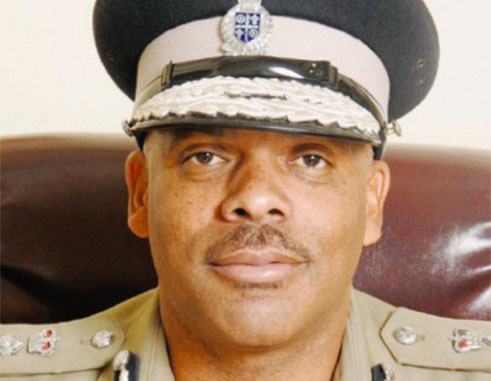
SINCE assuming the role of Acting Commissioner of Police last March, Errol Alexander’s job has been the most testing.
But the man who replaced Vernon Francois says he’s up for the daunting challenge of restoring confidence and pride in the Royal Saint Lucia Police Force (RSPLF).
During a sit-down with the media in his office last Wednesday, Alexander, whose career spans three decades, said he is now experiencing “the most challenging times of my life and career, especially this year”.
Having spent nearly eight years as a senior officer, five of which he sat on the Force’s executive, Alexander said he is looking forward to some better tidings for both himself and the Force in the new year.
“My wish for the new year would be that the whole IMPACS situation be resolved so that it’s not hanging over the Royal Saint Lucia Police Force,” Alexander said. “Additionally, that the senior officers who are in acting positions – about 95% of our senior officers are in acting positions — are confirmed more or less to bring to the core the level of confidence and motivation.”
Alexander said the pressure from the public, the Force and other stakeholders has not made his job an easy one. Nevertheless, he said the work of ensuring law and order must go on to ensure a safe society. As the Force’s new leader, Alexander said each mistake made can only serve as experience, adding that he, too, had grown over the past nine months as police chief.
“I think that over the past couple of months my level of confidence and motivation has grown because I had a job to do (which was) to settle the organization by doing all within my power to provide that level of strong leadership to ensure that we are where we are today in terms of performance,” Alexander explained.
![Image: Director of Public Prosecutions, Victoria Charles-Clarke. [PHOTO: Stan Bishop]](https://www.thevoiceslu.com/wp-content/uploads/2015/11/Director-of-Public-Prosecutions-Victoria-Charles-Clarke.jpg)
[PHOTO: Stan Bishop]
Charles-Clarke’s contention was that the report based on the investigation into the alleged extra-judicial police killing of twelve men during a police crackdown between 2009 and 2011 was not compiled by an investigating official. For now, the IMPACS matter seems cold, but Alexander said the matter needs to be resolved.
“IMPACS will not go away until certain situations are resolved…It’s hanging over our heads (and) still causes a level of discomfort to me and other members of the Force. As to the way forward, if it is resolved, we would be a lot more settled,” he said.
When asked whether recent statistics reporting successes on the Force’s crime-fighting strategies had any positive impact on the Force’s morale that waned after excerpts from the IMPACS report were made public, Alexander said IMPACS was not the only crippling factor the Force had to deal with. He cited the Force’s perennial lamentations regarding inadequate resources as a thorn piercing deeper into its side.
“The resources to give the men to do the work can also cause their morale to go down because sometimes you just cannot squeeze water out of stone. However, the little areas of motivation where we can do with what we have is the most important thing that we’re preaching,” Alexander said.





![Attendees at the UHC logo and website launch [Photo credit: GOSL]](https://thevoiceslu.com/wp-content/uploads/2026/02/Attendees-at-the-UHC-logo-and-website-launch-380x250.jpg)






![Remnants of an alleged drug boat blown up in a lethal strike by the U.S. military last week surfaced off Canouan on Saturday [Photo credit : St Vincent Times]](https://thevoiceslu.com/wp-content/uploads/2026/02/Remnants-of-an-alleged-drug-boat-blown-up-380x250.jpg)

